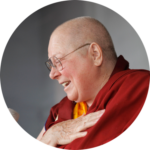
This Saturday at 9:00 am Pacific Time, we read a preliminary translation of a sutra by H.H. Dorje Chang Buddha III entitled “A Monk Expounds the Absolute Truth to a Layperson.” This wonderful Dharma work consists of two parts: In the first part the Buddha Master corrects misconceptions people have of His many treatises or commentaries as He refers to them at the time as this was released before we knew that He was a Buddha. Writings by a Buddha are more properly referred to as sutras, which is why we now label it as such. He said that people often make the mistake of thinking that His writings contain “subtle Zen messages, Buddhist principles, or the philosophies of Confucius, Lao-tzu, or Chuang-tzu.” His other treatises instead usually discuss the “original nature of the universe and human life as well as the original nature of modern science and philosophical thought.” However the treatise A Monk Expounds the Absolute Truth to a Layperson is an exception. I think you will understand why when you can hear it. You will also understand how the Chinese character shown above for “mind” or “heart” is used in the sutra. It needs to be noted that this was written in China when the Buddha Master was quite young.
We also read a preliminary translation of an “Essay on Experiencing Effects (Doctrine of Usefulness)” by Dharma King Zun Sheng that everyone should understand, especially any disciples having received or wanting to receive initiation and practice special Dharmas. Without understanding the true meaning of this essay they will not be able to experience any effects from their practice of the Dharma. It explains the rule of the “correspondance of the three karmas” and the importance of cutting off doubt and establishing resolute faith. I have mentioned this essay to some of you who have asked me about the role “faith” plays in Buddhism and how one becomes a “casual Bodhisattva.”


🌔🌈🌈🌈🌈🌈☀️
sunmoonlight